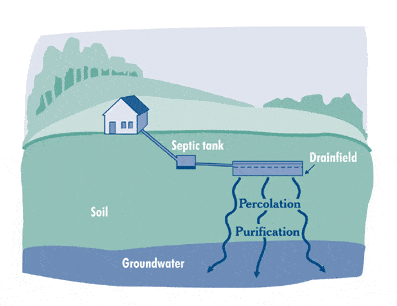Disclosure: This post contains affiliate links, meaning we may earn money or products from the companies mentioned in this post if you purchase a product through one of our links. An example would be Amazon.
Should I get a septic inspection when buying a home?
Modern septic tanks last for two decades or more, depending on the construction material. No matter what type of septic tank you have, you can easily add 5-10 years to its life by getting it inspected regularly. While there is no bad time for having a septic inspection, it is a must-have if you are buying (or selling) a home. Without it, you will miss out on important details, which may cost you dearly in the future.
So, should you get a septic inspection when buying a home? The answer is an emphatic YES. A septic inspection can tell you what is really going on with the septic system in question so that you do end up spending hundreds of dollars or more on its repair soon after purchasing the home.
Call Septic Service Pros 1.855-925-0760 For Service or Request a Quote
Should you get septic inspections when buying a house?
Of course, you should. There is no doubt about that. The entire purpose of a septic inspection is to provide you with a health report about the home’s septic tank. Without it, you may buy a house with a crumbling septic system and end up spending a lot of money getting it fixed or replaced.
What is a septic inspection?
Septic systems are becoming more and more popular in the US by the day. By some estimates, in some parts of the US, more than 25% of the households use a septic system. A septic system, simply put, treats and disposes wastewater from your toilet, sinks, washing goods, and showers.
Septic tanks are built to last a long time, but that doesn’t mean they cannot suffer from structural problems. Common septic problems include clogged drainfield or blockages in plumbing. Problems with your septic system impacts not only wastewater treatment but also can be a health hazard. In spite of serious health implications of living in close proximity to a badly-functioning septic system, homebuyers sometimes overlook inspecting it before buying a property. We recommend you not to make the same mistake.
You should hire either a pre-sale inspector or a licensed septic system professional and get the septic system in question inspected. A septic inspection is a formal check-up of a septic system. The pre-sale inspector or the licensed professional will give you a detailed report on the health of the septic system. The report, among other things, will detail the current health of the septic tank, list leakages around the septic tank site (if any) and their severity, and tell you how many years the tank is expected to last.
What happens during a septic inspection?
Septic inspections are basically of two types: a basic visual inspection and a comprehensive inspection.
A visual inspection, as the name suggests, involve a visual inspection of the septic tank. The septic inspector will likely also conduct a dye and basic loading test.
To start the visual inspection of your septic system, the inspector will open the lid to access the tank manhole and take photos of its interior. A dye and loading test involves flushing a special dye through the septic system to identify wastewater leakages.
A comprehensive inspection involves a visual inspection and more. In addition to the visual inspection, the septic inspector will examine the system from top-to-bottom, which includes mechanical plumbing, electrical components, sludge/scum levels, and effluent screens.
Who pays for the septic inspections?
Much like a pest and building inspection, a septic inspection is something that is paid by the buyer. As to the question of how much does a septic inspection cost, that depends on many factors, including where you live, the age and type of septic tank in question, and the chosen inspection level etc. Generally speaking, you can expect to pay in the range of $250 to $400 for an inspection conducted by licensed technician.
Call Septic Service Pros 1.855-925-0760 For Service or Request a Quote
How often should one opt for a septic inspection?
By most estimates, it is important to get your tank inspected at least once every 3 to 5 years. While you can have the tank inspected anytime you want, but you should definitely consider a detailed inspection while you are getting the tank pumped out. Having your septic system inspected on a regular basis is important, because that helps not only fix potential minor issues before they metastasize into a huge problem but also prolong the life of the your septic system.
In most instances, it is only when tell tale signs of septic problem start surfacing, like backflow or foul smell in and around the leach field, that homeowners go in for a septic inspection. But the thing to understand is that a small septic tank is easier and cheaper to fix, while the cost of fixing a complicated issue can easily run into a few hundreds of dollars, if not a thousand. By having your septic tank inspected regularly, you can get its detailed health report from time to time and fix an issue, like a leaking septic tank, before it mushrooms into a huge, costly problem.
How long does a septic tank inspection take?
In most instances, a septic inspection takes anywhere between 45 mins and 2 hours. Naturally, larger septic tanks require more time than smaller tanks. Also, if the inspection suspects a complicated issue with the tank, the inspection will likely take close to 2 hours, or even more. Having said that, it is unusual for a septic inspection to take more than 3 hours.
Does the septic need to be pumped for an inspection?
A basic, visual inspection does not require pumping the tank for inspection. However, a full inspection does. The septic technician will pump out your tank before inspecting it to ensure it is working efficiently and properly.
When Do You Need a Septic Tank Inspection?
Are you experiencing any plumbing issue? If so, get the tank inspected immediately. A delay could complicate the matter and make the problem more severe, not to mention more costly.
Even though the following list cannot be said complete by any stretch of imagination, it mentions common instances when you should go for a septic inspection.
- A foul smell in and around the drain field
- Pooling water in the yard
- A lot of vegetation growing around the tank’s location
- Water inside the house draining slowly
- Sewage water backing up
- Foul smell coming from the drain pipes
You should do not delay an inspection if you notice any of these signs, especially the last three, as they point toward a full septic tank, which means a pumping is need. Read this to find out what to do if your septic fails inspection.


